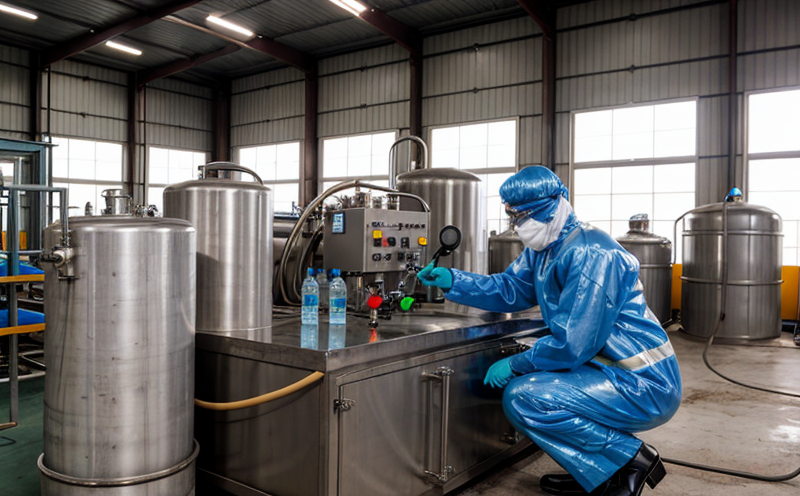Creep testing for materials used in chemical processing
Unlock the Secrets of Material Degradation Why Creep Testing is Essential for Chemical Processing
In the chemical processing industry, materials are subjected to extreme temperatures, pressures, and corrosive environments, which can lead to degradation over time. This degradation can compromise the safety and performance of equipment, posing significant risks to personnel, the environment, and business operations as a whole. One critical laboratory service that helps mitigate these risks is Creep testing for materials used in chemical processing, offered by Eurolab.
What is Creep Testing?
Creep testing involves subjecting materials to constant stress at high temperatures over an extended period, typically several hundred hours or more. This process simulates the conditions found in real-world applications, allowing scientists and engineers to understand how materials will behave under load. By applying a specific stress to a material, researchers can measure its resistance to creep deformation, which occurs when materials slowly deform under constant stress without a proportional increase in load.
Why is Creep Testing Essential for Chemical Processing?
Creep testing provides invaluable insights into the behavior of materials used in chemical processing equipment, enabling businesses to make informed decisions about their assets. By conducting creep tests on key components, companies can
Identify material weaknesses Understand how different materials will degrade over time under specific conditions, allowing for the selection of more suitable materials.
Predict component lifespan Estimate when critical components are likely to fail due to creep deformation, enabling proactive maintenance and replacement strategies.
Improve safety Prevent catastrophic failures by identifying potential weak points in equipment before they cause harm to personnel or the environment.
Enhance efficiency Optimize material selection and reduce downtime by understanding how different materials will perform under various operating conditions.
Benefits of Creep Testing for Chemical Processing
The advantages of creep testing for chemical processing are numerous, including
Cost savings By identifying potential issues early on, companies can avoid costly repairs or replacements.
Increased safety Reduce the risk of equipment failure and associated hazards to personnel and the environment.
Improved performance Select materials that meet specific application requirements, leading to increased efficiency and productivity.
Compliance with regulations Demonstrate compliance with industry standards and regulations by conducting thorough material testing.
Applications of Creep Testing in Chemical Processing
Creep testing has a wide range of applications across various chemical processing sectors, including
Petroleum refining Evaluate the performance of equipment components subjected to high temperatures and corrosive environments.
Petrochemicals Test materials used in reactors, heat exchangers, and other critical equipment exposed to extreme conditions.
Fertilizers and chemicals Assess the behavior of materials under stress at various temperatures, ensuring optimal performance in corrosive environments.
Case Studies Success Stories from Eurolab
At Eurolab, we have helped numerous clients achieve significant benefits through creep testing. One notable example involves a leading chemical processing company that utilized our services to evaluate the performance of critical equipment components. By conducting comprehensive creep tests, our team was able to identify potential weaknesses and recommend suitable material upgrades. The result? Reduced downtime, improved safety, and increased efficiency.
QA Frequently Asked Questions about Creep Testing
What is the purpose of creep testing in chemical processing?
Creep testing helps companies understand how materials will behave under specific conditions, enabling informed decisions about equipment maintenance and replacement.
How long does a typical creep test take?
Test durations vary depending on the application, but standard tests can range from several hundred hours to over 1,000 hours or more.
Can I conduct creep testing in-house?
While its technically possible, most companies lack the necessary expertise and equipment to conduct accurate and reliable creep tests. Our experienced team at Eurolab ensures high-quality results.
What materials can be tested using Creep testing?
A wide range of materials can be tested, including metals (e.g., steel, aluminum), polymers, ceramics, and composites.
Conclusion
Creep testing is a vital laboratory service for businesses operating in the chemical processing industry. By understanding how materials will degrade over time under specific conditions, companies can reduce risks, improve safety, and optimize performance. Eurolabs expert team offers comprehensive Creep testing services to help clients make informed decisions about their equipment and assets.
Dont wait until its too late discover the benefits of creep testing today. Contact us at Company Name to learn more about our laboratory services and how we can support your business needs.
Additional Resources
Whitepapers Learn more about creep testing in chemical processing by downloading our complimentary whitepapers.
Webinars Register for upcoming webinars on creep testing and related topics, presented by our expert team at Eurolab.




